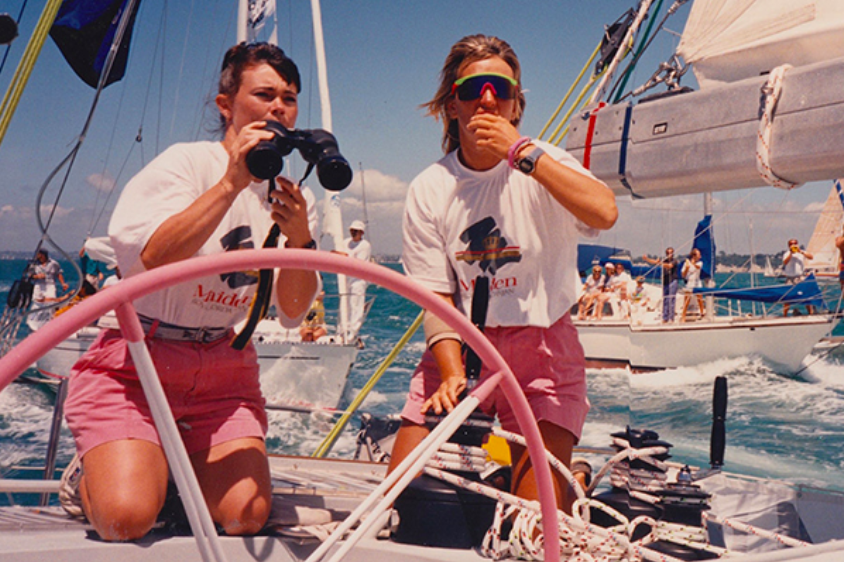
This past Friday, the British documentary “Maiden,” was released to Columbia moviegoers at Hitt Street’s Ragtag Cinema. The film, directed by Alex Holmes, centers around 1989’s Whitbread Round the World Race, a sailing competition in which participants from various nations are tasked with circumnavigating the globe in sailboats. Until 1989, the sport of sailing itself was very much a boy’s club, but one sailor, Tracy Edwards, sought to change that.
About four years pre-Whitbread, Edwards assembled a team of talented female sailors and revamped a secondhand sailboat by mortgaging her home. Eventually, she gained a sponsorship from Royal Jordanian Airlines, an airline based in Amman, Jordan. Jordan’s King Hussein also ended up being one of Edwards’ greatest sponsors and mentors. Edwards herself is a stoic figure, in that she is determined to be an advocate for her fellow female sailors no matter the cost.
Local documentary filmmaker Megan Casady attended one of the first showings of the film at Ragtag. She said she could not be more stunned and proud of the story of Edwards and her crew. In addition, she finds Edwards to be someone who she, as a woman, can relate to.
“It was very relatable as a woman working in an industry that is dominated by men and I think a lot of women in many industries are often told they can’t do something,” Casady said. “So I just hope that this film and others like it can be an example for young women [about] what they [can] aspire to do.”
For moviegoers like Casady, the film is not just one that lifts their spirits, but one that also forces its audience members to evaluate the way in which women are portrayed in the 2019 media, compared to how they were portrayed when the Whitbread Race took place three decades ago.
Women’s rights advocate and MU senior Mara Busch explains how these changes in the portrayal of women are important. At the same time, there is an extraordinarily long way to go in portraying women in a fair, non-stereotypical light.
“I think [the media’s portrayal of women] is definitely changing right now. In the political climate, we are seeing more and more women running for office,” Busch said. “Especially after 2016 with Hillary Clinton being one of the first presidential nominees for a major party, I think that really opened up a lot of doors for people to feel like they have a space and an opportunity. I think that’s allowing the media to start portraying women in more powerful positions and not just being in caregivers or family roles, as opposed to how it was in previous decades. There still is quite a bit of a way to go.”
After the Whitbread Race ended in May of 1990, Tracy Edwards was crowned Yachtsman of the Year. The media scrutiny that she had faced as a female athlete during the race, however, followed her post-Whitbread. This coverage especially surrounded her mother, who suffered from multiple sclerosis and was one of Edwards’ inspirations. At the same time, Edwards said that the way in which women are able to talk to each other about their emotions via social media with less judgement is something that keeps her grounded.
“I wanted to keep the legacy going, but I was suddenly on my own,” Edwards told Vanity Fair. “I did have my mum. But when I got married and divorced very quickly, the press became intrusive, climbing in my mum’s back garden while she was ill. I did get to the point where I fell over big time. I love this part of social media, where I see people saying, ‘If you can’t do it on your own, ask for help. There’s people there.’ And [how we’re] educating people about depression, now we can all talk about it.”
For many female athletes, such as tennis player Serena Williams, the media has often sought out information on their personal lives, rather than their athletic accomplishments. Busch has noticed this first hand, not just in sports, but also in other positions in which women defy the stereotypes of being gentle or complacent.
“People want women to be more docile and not express their gratitude or happiness for achieving great things as much as men do,” Busch said. “I think they’re expected to lay low more. I definitely see ways in which women’s teams are treated over the men’s team. I can see some areas where it [the media] is getting better, but I still do think that it is focusing a lot more on their personal lives, or even what they are wearing. Serena Williams for example, they [the media] are so focused on what she’s wearing and how she has a child. And while that’s a part of her life that I’m sure she values, that’s not how men are treated.”
When Edwards and her crew sailed into their final port in Southampton, England, the ship was greeted by thousands of other spectators on land and in other boats and escorted through the harbor and across the finish line. While Maiden did not win first place at the end of the race, its sailors had overcome something that had previously held them back: the patriarchy that had surrounded sailing, and sports for that matter, for decades.
_Edited by Janae McKenzie | [email protected]_